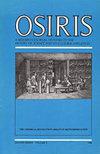喂养欲望:1700-1750年英国的繁殖环境、肉类市场和绵羊性交管理
IF 1
3区 哲学
Q2 HISTORY & PHILOSOPHY OF SCIENCE
引用次数: 6
摘要
作为一种基于繁殖、生长和饮食的利润体系,畜牧业为研究资本主义如何塑造身体知识提供了一个理想的场所。最近关于繁殖史的研究证明了这一点,显示了“血液”中的新市场如何帮助定义遗传和种族的新理论。本文通过考察18世纪英国控制动物繁殖的另一个方面:欲望来扩展这一文献。在反季节羔羊肉市场变化和财产结构扩大的刺激下,牧羊人、农民和农业作家通过给母羊喂食壮阳食物、改变性行为的方式来激发母羊的季节性欲望,以及创造“人造”草地景观,以帮助母羊摆脱季节的限制。他们的努力引起了我们对更广泛的身体专家的关注,从医生到专业喂食者,再到林奈植物学家,他们对景观塑造身体的方式感兴趣。文章认为,这些形式的环境控制仍然是资本主义农业的基础,在知识和景观方面都留下了重要的现代痕迹,并提供了丰富且相对未开发的身体知识来源。本文章由计算机程序翻译,如有差异,请以英文原文为准。
Feeding Desire: Generative Environments, Meat Markets, and the Management of Sheep Intercourse in Great Britain, 1700–1750
As a system of profit based on reproduction, growth, and eating, animal husbandry offers an ideal place to examine how capitalism shapes knowledge of bodies. Recent work on the history of breeding demonstrates this, showing how new markets in “blood” helped define new theories of heredity and race. This essay expands on this literature by examining eighteenth-century British efforts to control a different aspect of animal reproduction: desire. Spurred by changing meat markets in out-of-season lamb and expanding property structures that created sex-segregated herds, shepherds, farmers, and agricultural writers worked to provoke the seasonally dependent desires of ewes by feeding them aphrodisiac foods, changing the ways that sex was staged, and creating landscapes of “artificial” grass timed to help ewes escape the constraints of the seasons. Their efforts draw our attention to a broader range of bodily experts, from physicians, to professional feeders, to Linnaean botanists, who were interested in the ways that landscapes could be made to shape bodies. The essay suggests that these forms of environmental control, which still undergird capitalist farming, have left significant modern traces on both knowledge and landscapes and offer a rich and relatively untapped source of bodily knowledge.
求助全文
通过发布文献求助,成功后即可免费获取论文全文。
去求助
来源期刊

Osiris
管理科学-科学史与科学哲学
CiteScore
1.10
自引率
0.00%
发文量
18
审稿时长
>12 weeks
期刊介绍:
Founded in 1936 by George Sarton, and relaunched by the History of Science Society in 1985, Osiris is an annual thematic journal that highlights research on significant themes in the history of science. Recent volumes have included Scientific Masculinities, History of Science and the Emotions, and Data Histories.
 求助内容:
求助内容: 应助结果提醒方式:
应助结果提醒方式:


